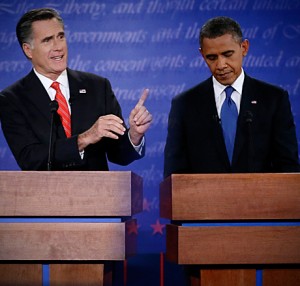 The first presidential debate of the season looked like it would be one of those where one candidate clearly wins when you look at the transcript later, but the other looks like the winner just from the visceral presence on the screen (and who reads the transcripts later anyway? Certainly not those so dismissive of the process that they’re still undecided).
The first presidential debate of the season looked like it would be one of those where one candidate clearly wins when you look at the transcript later, but the other looks like the winner just from the visceral presence on the screen (and who reads the transcripts later anyway? Certainly not those so dismissive of the process that they’re still undecided).
So yes, Mitt Romney looked like the toothy, smiley aggressive one, looking for all the world like the Dodge Ram salesmen with a Rocktober sale on a late night TV pitch. Smiling, looking friendly, interrupting and mostly, saying whatever it takes to make you change your mind about him, even if it means changing course on campaign statements he had been making up to now.
That willingness to flip around so fearlessly clearly rattled President Obama as Romney just denied the things Obama would cite about his (apparently former) plan. Also, Romney had to do well or his already almost written-off campaign was through.
He’d learned a few things from the 50 hours of Republican primary debates he’d been in this year alone: It was all about style and zero about substance. So when the other guy is speaking, he’d tilt his head and smile in a patronizing way that all the Republican candidates have learned to do. It’s a smile that seems to say: “Look, he’s trying to defend himself? Isn’t that cute? He’s so far from reality it’s sad.” Actually, it indicates: I’m listening to anything you’re saying. I’m letting you talk while the next preplanned zinger is cued up in my head. So then: He’s doing one talking about Obama’s plane and house, as if he doesn’t have a plane and three houses and one with a car elevator.
Obama wasn’t coached enough by his team. Or they didn’t know they’d be in split screen just about the whole time, so that instead of being on opposite sides of the stage at the University of Denver (where the audience was almost ghostly in their silence), behind podiums that were actually facing one another, they appeared on screen to be side by side looking straight out.
(The full sized shot of one candidate talking to the other was hardly ever used, though it was the most effective in conveying their give-and-take).
That meant Obama’s slow, measured and sometimes halting policy explanations were undercut by Romney’s patronizing smile; and while Romney spoke emphatically, Obama, maybe not even knowing he was on screen, appeared to look down, tired and too visibly annoyed, as if he were enduring the last 20 minutes of a press conference.
Romney took control mostly because moderator Jim Lehrer didn’t. And though Lehrer got a lot of criticism for losing control of the 90 minutes, there was every indication he meant to let the two have at it back and forth most of the time.
After all, that hadn’t happened in all of the campaign cycle yet. And it was far better than the bells and sirens of the too-controlled primary debates. Still, the effects of such unlimited wonkery meant audiences were turned off by content and concentrated on what it looked like. And it looked like Romney won.
Before the fact checkers got involved, that is.
And by then, the undecided had moved along to the “Here Comes Honey Boo Boo” marathon.